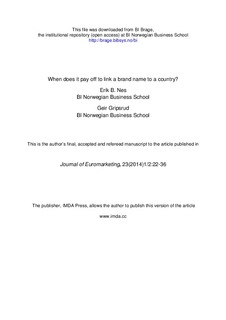When does it pay off to link a brand name to a country?
Journal article, Peer reviewed

View/
Date
2014Metadata
Show full item recordCollections
- Scientific articles [2181]
Original version
Journal of Euromarketing, 23(2014)1-2: 22-36Abstract
Some brands are associated with a country while others are not. From a managerial viewpoint, the main decision that must be made concerns when to make such an origin reference, and when to refrain from doing so. In this study, we propose that using country of origin in brand strategy enhances selected brand equity indicators whenever congruence exists between core brand image characteristics and country image. We suggest that general country image and brand image constructs often are insufficient to uncover the potential leveraging effects when applied on the individual brand level. We illustrate our arguments in an apparel brand case. The insights from the case indicate that brand equity is enhanced under the stated country-brand image congruence condition even when the country has no special reputation in the product category. Marketers should investigate whether brand image and country image have attributes that directly or indirectly are expressions of the same underlying characteristics. The general personality constructs (brand personality, country personality) and country image constructs (macro country image, micro country image) do not give sufficient insight into the full potential of leveraging brand equity by country of origin associations. Rather, the marketer must choose the constructs, user characteristics and country characteristics that seem most promising for exploring the case at hand. To our knowledge, the paper is the first that addresses this issue on the individual brand image level; the most important setting for the business manager who seeks ways of leveraging brand equity. The paper gives new insight into the roles of country of origin in brand strategy.
Description
This is the authors' accepted and refereed manuscript to the article.